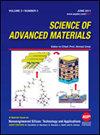The Mechanism of ITGB3 and PPIF Plasmid Construction on the Offspring of Rats with Intrauterine Adhesion and Bioinformatics Analysis
IF 0.9
4区 材料科学
引用次数: 0
Abstract
This study aimed to develop an animal model of pathologic regeneration of intrauterine adhesions (IUA) and assess the impact of ITGB3 and PPIF plasmid construction on the offspring of rats with IUA. Thirty female SD rats were divided into an experimental group and a control group. In the experimental group, the rats’ left and right endometrium underwent mild and severe mechanical damage using a self-made curette. The control group underwent a sham operation without endometrial injury. At various time points after surgery, uteruses were collected for analysis. Immunohistochemical staining was performed to evaluate changes in major histocompatibility complex II molecule (MHC II) and 5-bromodeoxyuridine (BrdU) in endometrial cells. The study observed the inflammatory and hyperplastic changes in endometrial tissue and the repair process in rats with different endometrial gland injuries. RNA interference (RNAi) sequences targeting the rat PPIF gene were designed and cloned into a lentivirus vector transfer plasmid, ITGB3. The number of endometrial glands decreased with increased mechanical injury. The PPIF short hairpin RNA (shRNA) fragment was successfully cloned into the lentiviral vector. After mild mechanical injury, the endometrial tissue regenerated to a basic repair level, while severe mechanical injury led to incomplete repair and tissue fibrosis, resulting in IUA.ITGB3和PPIF质粒构建对宫内粘连大鼠子代影响的机制及生物信息学分析
本研究旨在建立宫内粘连病理再生的动物模型,并评估ITGB3和PPIF质粒构建对宫内粘连大鼠后代的影响。将30只雌性SD大鼠分为实验组和对照组。在实验组中,使用自制刮匙对大鼠的左右子宫内膜进行轻度和重度机械损伤。对照组在没有子宫内膜损伤的情况下进行了假手术。在手术后的不同时间点,收集子宫进行分析。免疫组织化学染色评估子宫内膜细胞中主要组织相容性复合体II分子(MHC II)和5-溴脱氧尿苷(BrdU)的变化。本研究观察了不同子宫内膜腺损伤大鼠子宫内膜组织的炎症和增生变化及修复过程。设计了靶向大鼠PPIF基因的RNA干扰(RNAi)序列,并将其克隆到慢病毒载体转移质粒ITGB3中。子宫内膜腺体的数量随着机械损伤的增加而减少。将PPIF短发夹RNA(shRNA)片段成功克隆到慢病毒载体中。轻度机械损伤后,子宫内膜组织再生到基本修复水平,而严重机械损伤导致修复不完全和组织纤维化,导致宫内节育器。
本文章由计算机程序翻译,如有差异,请以英文原文为准。
求助全文
约1分钟内获得全文
求助全文
来源期刊

Science of Advanced Materials
NANOSCIENCE & NANOTECHNOLOGY-MATERIALS SCIENCE, MULTIDISCIPLINARY
自引率
11.10%
发文量
98
审稿时长
4.4 months
 求助内容:
求助内容: 应助结果提醒方式:
应助结果提醒方式:


